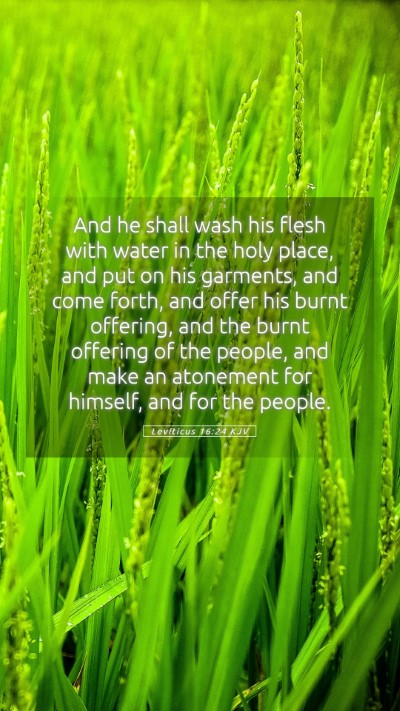Understanding Leviticus 16:24
Bible Verse: "And he shall wash his flesh with water in the holy place, and put on his garments, and come forth, and offer his burnt offering, and the burnt offering of the people, and make an atonement for himself, and for the people." - Leviticus 16:24
Overview and Significance
Leviticus 16:24 is part of the Day of Atonement (Yom Kippur) rituals, which highlights the role of the High Priest in Israel’s annual process of seeking forgiveness from God for the sins of the people. This verse encapsulates the necessary steps the High Priest must follow to maintain ceremonial purity before offering sacrifices for himself and the people.
Commentary Insights
-
Matthew Henry's Commentary
Henry emphasizes the importance of the purification process, noting that the washing of the flesh in water symbolizes the cleansing necessary to approach God. It signifies the gravity of atonement and highlights that no one can enter God's presence without being purified.
-
Albert Barnes' Commentary
Barnes points out that the act of washing represents both physical and spiritual purification. The High Priest's rituals served as a type or foreshadowing of the ultimate sacrifice of Christ, who would fulfill the necessity for atonement by providing complete redemption for sins.
-
Adam Clarke's Commentary
Clarke notes that the specified actions of washing and changing garments underline the seriousness of the priestly duties. The emphasis is on the separation of sacred from profane, illustrating the need for holiness when approaching God. Clarke also discusses the significance of garments in the context of God's call for holiness and righteousness.
Deeper Biblical Exegesis
This verse serves not only historical significance but also theological implications. The rituals performed by the High Priest are a precursor to Christ’s work on the cross. The washing can be seen as comparable to the baptism that signifies a new beginning and a commitment to a holy life.
Application for Believers
In practical terms, believers today can reflect on the themes of purification and atonement in their lives. Just as the High Priest underwent rigorous processes to stand before God, Christians are called to pursue holiness and seek spiritual purification through Christ's sacrifice.
Importance of Context
Understanding the historical context of Leviticus—where the Israelites were defining their identity as a people under God's covenant—adds depth to Scripture analysis. The rituals established in this book directly point to themes of sin, atonement, and the necessity of sacrifice, which resonate throughout the Bible.
Related Scriptures
- Hebrews 9:7 - Discusses the Day of Atonement and the sacrificial system.
- Exodus 30:19-21 - Instructions on how the priests should wash to remain pure.
- Isaiah 53:5 - Foretelling Christ’s sacrificial role in atoning for our sins.
- Romans 5:8 - Emphasizes God’s love through atonement in Christ.
Conclusion
Leviticus 16:24 encapsulates profound truths about holiness, purification, and the call to atonement that continues to resonate in Christian teaching today. For those engaged in Bible study groups, online Bible study, and various Bible study lessons, this verse offers rich material for discussion and reflection on the nature of God’s forgiveness and the call for a holy life.
Further Reading and Study Resources
- Explore more about the significance of sacrifice in the Old Testament.
- Engage with Bible study tools that delve deeper into atonement themes.
- Consider how the themes of Leviticus apply to everyday life and personal faith.
How to Interpret This Verse
When examining Leviticus 16:24, consider the cultural practices of Israelite worship and the purity laws that governed their interactions with the divine. The careful observance of ritual as described in this verse serves as a foundation for understanding the gravity and significance of sin and redemption.
Keywords
Primary Keywords: Bible verse meanings, Bible verse interpretations, Bible verse understanding, Bible verse explanations, Bible verse commentary, Scripture analysis, Biblical exegesis, Bible study insights, Meaning of Bible verses, Understanding Scripture.
Secondary Keywords: Bible study groups, Online Bible study, Bible study tools, Bible study resources, Bible study guides, Bible study lessons, Bible study topics, Bible study plans, Bible study materials, Bible study courses.
Long-Tail Keywords: How to interpret Bible verses, Understanding difficult Bible passages, In-depth Bible verse analysis, Historical context of Bible verses, Applying Bible verses to daily life, Meaning of parables in the Bible, Significance of Jesus' teachings, Old Testament prophecy interpretations, New Testament epistle explanations, Symbolism in the Book of Revelation.
User Intent Keywords: What does Leviticus 16:24 mean, Explanation of Leviticus 16:24, Commentary on Leviticus 16:24, Significance of Leviticus 16:24, Application of Leviticus 16:24.


